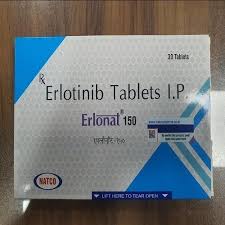Erlonat 150mg is a medication used to treat certain types of non-small cell lung cancer (NSCLC). It is an oral tyrosine kinase inhibitor that works by blocking the activity of the epidermal growth factor receptor (EGFR), which is a protein that helps cancer cells grow and multiply.
Composition:
- Erlonat 150mg: Erlotinib (150mg)
Mechanism of Action:
Erlotinib, the active ingredient in Erlonat, works by:
- Binding to the EGFR protein on the surface of cancer cells, thereby blocking the signal that promotes cell growth and division.
- Inhibiting the activity of downstream signaling pathways that promote cell growth and proliferation.
Uses:
Erlonat 150mg is used to treat:
- Locally advanced or metastatic NSCLC in patients who have not responded to previous treatment.
- Maintenance therapy for patients with locally advanced or metastatic NSCLC who have responded to previous platinum-based chemotherapy.
Dosage:
The recommended dosage of Erlonat 150mg is:
- 150mg taken once daily, with or without food.
Side Effects:
Common side effects of Erlonat may include:
- Rash
- Diarrhea
- Fatigue
- Nausea and vomiting
- Loss of appetite
- Headache
- Increased risk of bleeding
Recommendation:
Erlonat is recommended for patients who have been diagnosed with NSCLC and have not responded to previous treatment or have disease that has progressed after platinum-based chemotherapy. It is essential to discuss the benefits and risks of this medication with your healthcare provider before starting treatment.
Important Note:
- Erlonat should not be used in combination with other medications that may increase the risk of bleeding or liver damage.
- Patients taking Erlonat should be closely monitored for signs of liver toxicity, such as elevated liver enzymes or liver failure.
- Pregnant or breastfeeding women should not use Erlonat, as it may harm the fetus or infant.
- Regular follow-up appointments with your healthcare provider are necessary to monitor the effectiveness of Erlonat and to detect any potential side effects or complications.
Special Precautions:
- Patients with a history of pancreatitis should be monitored closely for signs of pancreatitis while taking Erlonat.
- Patients with a history of kidney disease should be closely monitored for signs of worsening kidney function while taking Erlonat.
- Patients taking Erlonat should avoid taking other medications that may increase the risk of bleeding or liver damage.




Reviews
There are no reviews yet.